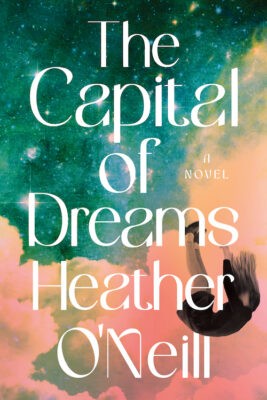Adversity is often a quicker builder – and revealer – of character than comfort. In her remarkable fifth novel, Heather O’Neill leaves her familiar stomping grounds, the streets of Montreal, for crumbling Elysia, a small, highly artistic and nature-revering country in Europe. Against this imaginary, yet convincing, backdrop, characters are cruelly tested by the ravages of war. Crafting a spellbinding story plush with metaphors and archetypes, here, the award-winning Montreal author combines the magic of traditional, unsanitized fairy tales with modern feminist features.

The Capital of Dreams
Heather O'Neill
HarperCollins Canada
34.99
cloth
368pp
9781443451604
Being separated from her mother hastens the young protagonist’s fraught journey into womanhood. Sofia is thrust into a ruthless world, in which self-preservation comes at an enormous cost. Fleeing for her life, she encounters others who’ve somehow escaped the clutches of death. “What wicked thing have you done to survive?” asks a calculating seducer.
Dead serious questions twist tension into O’Neill’s often playful and darkly humorous tone. “Was being trusting a sign of stupidity?” Sofia wonders, sadly cynical for her age. Placing as much faith in an escaped farm animal as in most people, she befriends a goose, and is delighted when he absurdly begins to talk. At once protective and scolding, the philosophizing gander seems to echo the girl’s internalized mother. Like Clara, he pontificates rather hilariously, playing the intellectual snob, his benevolent Mother Goose vibe tinged with criticism. Disquietingly, Sofia remains loyal (everyone wants him for dinner) even when he talks down to her, recalling the book’s complex mother-daughter theme.
Clara is larger-than-life even in her absence. Brilliant, yet grandiose, she blurs the line between genius and narcissism. Sofia both admires and resents her work, to which she feels secondary. Believing she’s been asked to risk her life for a manuscript – however important for her country – feeds her inner narrative that she’s unwanted. As though searching for a silver lining, she remembers “a girl about her age who wore a sparkling white leotard and rode a bicycle across a high wire” in the travelling circus. “No mother had worried about this child dying. Sometimes neglect can help you discover your potential,” she reflects.
The Capital of Dreams is loaded with such zingers. While sorrow dances ever so elegantly with delight, and the winsome and wicked interweave, one often has the sense of tiptoeing across a minefield that’s cleverly carpeted with lush, poetic language. Meanwhile, the forest to which Sofia turns for protection is “filled with elf trees,” adding supernatural sparkle to the narrative as the girl draws from her ancestors’ lore.
Though magical, this isn’t a land where Prince Charming or Fairy Godmother comes to the rescue. To survive, Sofia must turn fiercely feral. And, as enemies and compatriots become harder to distinguish, her development is, in fact, greatly propelled by disenchantment. Emerging from the woods, she recognizes that she’s “no longer a child.”
Clara’s conviction “that people had no idea how they would behave during wartime until there was an actual war” rings true when a fatal betrayal is exposed in the finale. Anyone expecting a straightforward moral to the story may feel destabilized. What’s clear is The Capital of Dreams is inhabited by captivatingly complex female characters whose drama underscores the power of words. Clara’s manuscript – be it a curse or a charm – is of serious and surprising consequence. Meanwhile, O’Neill’s own bold and bewitching words, steeped in symbolism, are as exciting to unpack as an epic dream.mRb






0 Comments